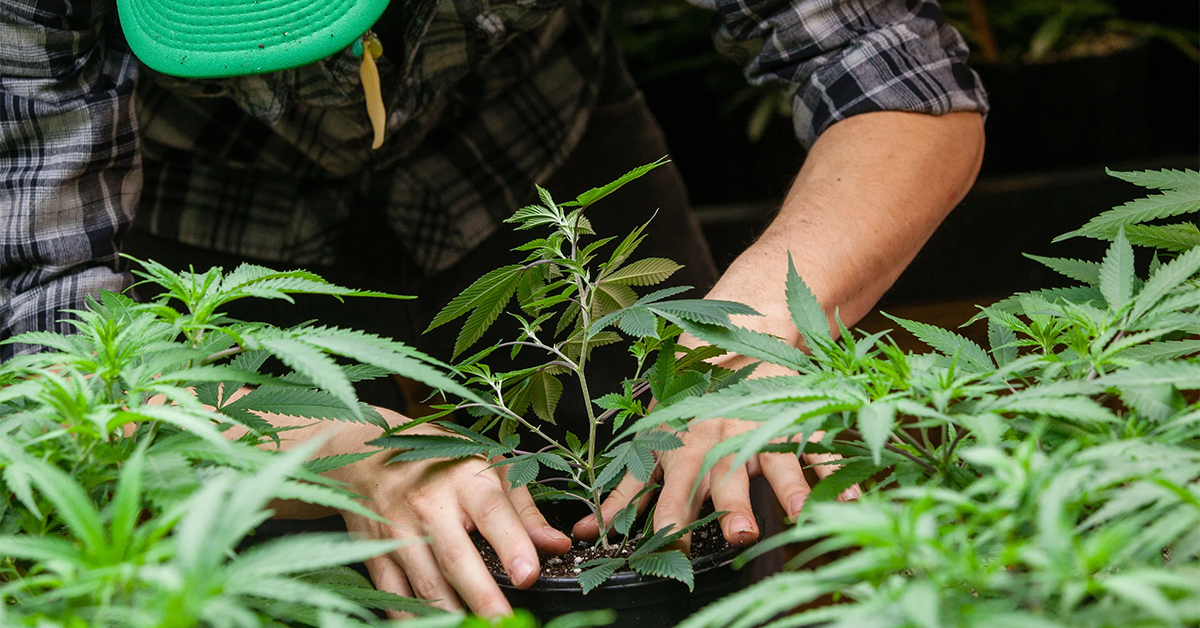Cannabis Consumption and Cardiovascular Health

Recent findings from a study published in the American Journal of Cardiology have indicated that habitual cannabis use may not amplify the risk of heart attacks among middle-aged adults. Surprisingly, the research even hints that recent cannabis consumption might correlate with decreased likelihood of such events.
Yet, this doesn't necessarily certify marijuana as a heart health booster. The complex relationship between cannabis and heart health continues to be explored, and some past studies have insinuated potential risks tied to its consumption.
This recent examination was spearheaded by specialists from the University of California-San Diego (UCSD). They analyzed data from about 10,000 middle-aged adults (average age of 47.3) who participated in the National Health and Nutrition Examination Survey (NHANES) between 2009 and 2018.
Of these respondents, nearly a quarter admitted to prolonged monthly cannabis use. The average age of this group was 48.1 years, and most identified as white. Notably, those with extended cannabis use also reported engaging in more weekly physical activities compared to non-users.
However, a detailed analysis found no significant link between monthly cannabis use and increased heart attack risks. Jamie Corroon, ND, MPH, the primary author from UCSD, observed that while cannabis users tended to indulge in more detrimental habits such as smoking and drinking, they also exhibited health benefits like higher physical activity levels and better metabolic profiles. This duality raises questions regarding which factors outweigh the other in terms of cardiovascular risk.
Interestingly, the study unveiled that among prolonged cannabis users, those who hadn't consumed recently faced higher odds of a heart attack than their more recent counterparts. The authors posited that some users might halt consumption due to health worries, which might elevate their heart attack risk—similar to the 'smoker's paradox' in tobacco studies.
In light of these findings, the research team emphasized the need for further in-depth studies, particularly those focusing on cannabis potency and detailed consumption patterns, given the worldwide proliferation of cannabis accessibility.
A Different Take on Cannabis and Heart Health
Separately, Dr. Kristie M. Harris from the Yale School of Medicine weighed in on this topic in a commentary for the American Journal of Cardiology. She underscored the importance of understanding cannabis's cardiovascular effects, given its known short-term impacts such as increased heart rate and potential blood vessel dysfunction.
Harris also pointed out the methodological challenges facing current research, especially concerning the evolving nature of cannabis products, with newer, more potent variants entering the market. Highlighting the infancy stage of our comprehension of cannabis's cardiovascular effects, she urged for more comprehensive studies to bridge the gap between the present findings and prior research.
In conclusion, while these revelations are enlightening, it's evident that the full story on cannabis and cardiovascular health remains yet to be written. As marijuana becomes more mainstream, understanding its full spectrum of health implications is paramount.
Saginaw Shooting Over Marijuana Dispute Leaves One Dead

In the chilly days leading up to Christmas, amidst the festive fervor and joyful anticipation, a chilling incident unfolded in the quiet town of Saginaw, casting a shadow over the celebrations. At a seemingly innocuous locale - a car wash named Tae & G's Hand Wash and More, situated on 2211 E. Holland Ave. (M-46) - a group of friends gathered, sharing stories, laughter, and sips of prescription cough syrup. Their jovial evening was soon to be marred by violence and tragedy, forever etching December 13th into the annals of Saginaw's history.
Central to this narrative were several key players, each with their roles to play in the unfolding drama. Delano C. "Scootie" Green, a 31-year-old Saginaw native, known for his love of motorcycles, music, and the infectious laughter he brought to every gathering. Allen J. Foster, a 35-year-old, who, as events would reveal, had connections and grievances related to Green. Marcus T. Gilmer, a 33-year-old co-owner of the car wash where the incident took place, and an unnamed third individual, shrouded in mystery but deeply implicated in the evening's events.
While festive lights twinkled in homes and Christmas carols played in the background, these lives collided in a whirlwind of accusations, confrontations, and ultimately, gunfire. This article dives deep into the sequence of events, eyewitness accounts, and the subsequent investigation to paint a comprehensive picture of that fateful night.
Michigan Psychedelic Research Explores Psilocybin for Chronic Pain

While this piece isn't directly tied to marijuana, the parallels with the psychedelic community are undeniable. Both have faced challenges in understanding, acceptance, and research. At Michigan Marijuana News, we recognize the interconnected journey of these communities, driven by a pursuit of healing and well-being. We're proud to share this story, wishing the best for our brothers and sisters in the psychedelic realm as they push the boundaries of knowledge and acceptance.
In an innovative approach to understanding the brain and the transformative potential of psychedelics, the University of Michigan's newly inaugurated Psychedelic Center has fashioned its lab with elements reminiscent of a psychedelic experience. One of their major studies is examining whether oral psilocybin, the primary psychoactive component in certain mushrooms, can provide relief to fibromyalgia patients.
The research isn't just about the physical symptoms. It seeks to understand how the combination of psilocybin and psychotherapy can unlock profound psychological and spiritual insights, enabling patients to better manage and comprehend their ailments.
Kevin Boehnke, a leading researcher and an assistant professor at U-M, who himself has been diagnosed with fibromyalgia, elucidates the potential of psychedelics. "These substances, perhaps even cannabis, provide an avenue to approach aspects of oneself that have long been evaded. They offer a fresh perspective, making previously inaccessible issues come to the forefront, ready for introspection and understanding," he shared.
This exploration of psychedelics comes at a time when their therapeutic value is being reconsidered on a national scale. Cannabis acceptance appears to have catalyzed interest in psychedelics, but many challenges remain. Dr. George Mashour, the founding director of the Michigan Psychedelic Center, emphasizes that the journey into psychedelic research is both rigorous and crucial. "We are deeply committed to this scientific endeavor with a singular aim – to genuinely assist patients in need," Mashour remarked.
Currently, the center is zeroing in on fibromyalgia, a condition that afflicts millions across the U.S. Unlike traditional treatments that aim to suppress symptoms, psychedelics, as per the center's research, might assist patients in confronting and understanding their pain more directly.
The burgeoning interest in psychedelics is mirrored in legislative shifts across the nation. While states like Oregon and Colorado have taken strides to legalize psilocybin, Michigan too is showing signs of progressive change. Cities like Ann Arbor have already decriminalized psychedelics, and efforts at the state level are underway, spearheaded by advocates like Michigan Senator Jeff Irwin, who is championing personal cultivation and possession of psychoactive plants and fungi.
Yet, despite these advancements, Boehnke reiterates the urgency for developing more effective treatment modalities, especially for conditions like fibromyalgia. "The existing options leave much to be desired, and a vast number of individuals continue to grapple with their suffering. Our hope is to change that narrative," he concluded.
Rick Thompson: A Beacon for Cannabis Advocacy in Michigan
The cannabis community in Michigan and beyond mourns the loss of a true pioneer, Rick Thompson, whose contributions to the cause of cannabis normalization and advocacy spanned over a decade. Thompson's unwavering commitment to the industry, his passion for reform, and his heartfelt connections with countless individuals made him a force to be reckoned with.
From the bustling streets of Oak Park to the corridors of power in Michigan, Thompson's footprints are undeniable. A member of the Committee for a Safer Michigan since September 2011, Thompson played an instrumental role in propelling Michigan's 2018 cannabis legalization initiative to fruition. A true citizen journalist, he was also a cherished member of the Michigan Association of Compassion Centers, further advocating for safe and responsible cannabis consumption.
His educational background from the University of Michigan-Flint, where he studied African-Afro American Studies, English, and Biology, gave him a unique perspective that he carried into his advocacy work. Thompson's passion for cannabis and community transcended his role as an advocate; he was also a creative force, serving as the Editor-in-Chief at Michigan Medical Marijuana Magazine and contributing to notable publications like HIGH TIMES.
Colleagues and friends remember Thompson for his infectious smile, endless energy, and profound dedication to the cause. His role as a co-host on the Jazz Cabbage Café television show and his invaluable insights as the Executive Director of the NORML chapter in Michigan only scratch the surface of his multifaceted career. Rick Thompson was not just an advocate; he was a mentor, a friend, and a true believer in the power of cannabis to change lives.
Heartfelt tributes have poured in from all corners, remembering the dynamic personality that was Rick Thompson. His talent for capturing moments through photography, his eloquence in articulating the needs and challenges of the cannabis community, and his fearless leadership have been highlighted by many. Whether he was shouting "For Wakanda!" or rallying support for a cause close to his heart, Thompson's voice was a clarion call for change and progress.
Beyond the accolades and accomplishments, Thompson's legacy is best captured in the relationships he forged. From mentoring budding advocates to forging alliances with industry leaders, he was a beacon of hope, inspiration, and change. As we remember Rick Thompson, we are reminded of the power of passion, dedication, and the indomitable spirit of an individual who believed in a cause and dedicated his life to it.
Swartz Funeral Home, located at 1225 W. Hill in Flint, is overseeing the funeral arrangements for Thompson. Visitation is scheduled for Friday, September 22nd, from 3 p.m. to 8 p.m. A subsequent visitation will be held on Saturday, September 23rd, starting at 10 a.m., with the funeral service commencing at 11 a.m.
His battle with cancer may have taken him from us, but Rick Thompson's spirit remains alive in the countless lives he touched and the movements he inspired. The cannabis community, and indeed the world, is undeniably richer for having known him.
Rest in peace, Rick Thompson. Your legacy continues to inspire, and your contributions will never be forgotten.

Michigan's Green Gold Rush: Booming Sales, Falling Prices

Michigan's cannabis industry experienced a significant milestone in July, with sales surpassing the $276 million mark, encompassing both recreational and medical uses. These figures, reported by the Michigan Cannabis Regulatory Agency, suggest a promising trajectory for the state, with projections indicating that revenues could eclipse $3 billion for the first time this year. Should this trend continue, Michigan is poised to become the second-largest cannabis market in the country, trailing only California.
Despite the booming sales, challenges persist for retailers, many of whom grapple with thinning profit margins. One of the main culprits? A continuous decline in marijuana prices, despite a modest recent uptick.
The regulatory framework in Michigan allows the Cannabis Regulatory Agency to grant new licenses for growers every month. According to Beau Whitney, a senior economist at the National Cannabis Industry Association, this frequent licensing is a significant factor causing the current struggles for retailers. Whitney describes the situation as a "race to the bottom," where the sheer volume of competition is driving prices to unprecedented lows, a trend that is unsustainable in the long run.
In a detailed breakdown of July's licensing, the state processed 97 applications, granting 87 new licenses. A significant portion, 17 licenses, went to class C growers, who, under state regulations, are permitted to possess up to 1,500 plants.
Currently, Michigan boasts 2,080 active licenses for recreational cannabis. Intriguingly, over half of these licenses belong to class C growers or retailers.
Jerry Millen, proprietor of The Greenhouse dispensary located in Walled Lake in western Oakland County, provides further insights into the challenges the industry faces. He highlights the struggles of smaller, independent retailers facing stiff competition from major corporate entities, which, armed with deeper pockets, can afford to engage in aggressive pricing strategies, often to the detriment of smaller establishments.
Green Peak Industries stands as a testament to these market dynamics. This Dimondale-based cannabis company, with its Skymint-branded dispensaries scattered across the state, is known for its competitive pricing – typically below the average $99 per ounce as indicated by the Cannabis Regulatory Agency's report. However, despite their aggressive expansion, having opened over 20 locations since their debut in Ann Arbor in 2018, the company currently finds itself under receivership, with allegations of a staggering $127 million debt.
Following the legalization of marijuana in Michigan in 2018, a 10% excise tax was introduced, compounded by an additional 6% sales tax. This, coupled with high production costs and an oversaturated market, paints a complex picture for retailers – albeit a favorable one for consumers. For instance, consumers now enjoy a reduction of $23 on the price of an ounce of recreational marijuana compared to the previous year.
Interestingly, while prices have shown a general decline over the past year, they were slightly higher in February, when sales reached a remarkable $200 million.
It's worth noting that Michigan's marijuana market typically demonstrates seasonality. The warmer months often see a surge in prices, largely due to the increased costs of cultivating marijuana in indoor greenhouses compared to outdoor farms. As summer concludes, the predominant supply available for sale is the more costly, indoor-grown cannabis. However, this expected price hike hasn't been as prominent this year.
As harvest season looms, characterized by typically cheaper prices, retailers bear the brunt of cannabis taxation. They're left striving to innovate and collaborate with suppliers to ensure profitability.
Millen emphasizes a necessary paradigm shift for retailers: "Rather than obsessing over undercutting competitors, retailers should prioritize customer service, education, and mainstreaming marijuana." He nostalgically adds, "This race to out-price one another isn't in line with the original spirit and culture of the marijuana industry."
Michigan's Progressive Approach to Cannabis: An Evolving Employment Landscape

The shifting sands of marijuana legislation and public sentiment have spurred a nationwide debate. From coast to coast, states grapple with aligning their policies to the evolving legal status and societal perceptions of cannabis. While many regions oscillate in their stances, Michigan has emerged as a focal point of progressive change in the realm of employment-related cannabis policies. To truly understand the state's pioneering steps, we must first explore its historical perspective on cannabis, especially in the backdrop of its employment landscape.
Historically, Michigan, like much of the United States, maintained a stringent view on cannabis, particularly concerning its implications in the workplace. The age-old argument was straightforward: cannabis use could impair job performance, posing risks to both the individual and those around them. However, as the winds of change blew, states began to reevaluate their standpoints, with Michigan at the forefront of this transformation.
In this article, we'll delve deep into Michigan's paradigm shift, reflecting on its past, assessing the present, and speculating on its potential future impact.


 Helpful Links
Helpful Links